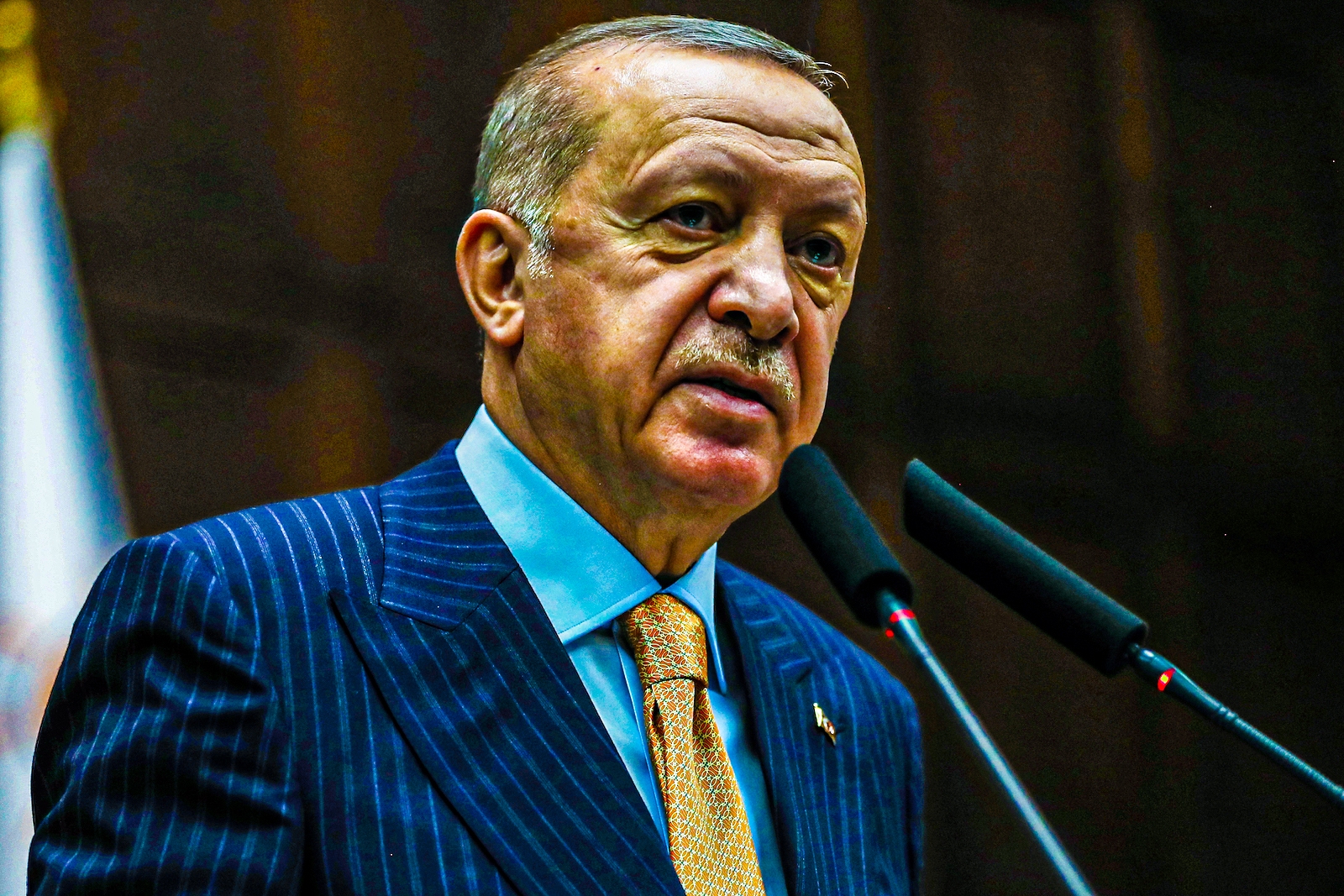
No Route for Turkey and the EU Other than to Cooperate
Cast your mind back to a picture that, for many, really was worth a thousand words.
It happened when Ursula von der Leyen, the president of the European Commission, found her fellow top EU official taking the only chair available next to Turkish President Recep Tayyip Erdogan when the duo visited Ankara.
Footage from their meeting showed the first female head of the European Commission, the only woman in the talks, gesturing in disbelief and uttering a surprised sigh as Erdogan and European Council President Charles Michel took the two centre-stage seats, relegating her to an adjacent sofa.
This happened almost one year ago, in April 2021 and, for many, seemed to sum up relations at the time between the European Union and Turkey.
But, nearly a year down the road, have things improved between the two sides?
It’s a question that was hot on the lips of participants in a recent high-level conference in Brussels about EU-Turkish relations.
It’s clear that the strategic relationship between Turkey and the EU has deteriorated but, as much as Turkey needs the European Union and NATO for its security, the EU and NATO needs Turkey too.
In a few crucial areas, the EU should consider cooperating with Turkey in a much more strategic way and Turkey could play an important role in Syria, in the Western Balkans, the Black Sea, and Afghanistan.
But, at the same time, closer cooperation doesn’t mean the EU should stop pushing Turkey on issues such as human rights and media freedoms. At the same time, Europeans need to acknowledge that Turkey is more than just Erdogan.
Since 1952, Turkey has been a staunch ally of the West in the areas of foreign policy and defence, especially within the framework of NATO. While assuming a crucial responsibility on NATO’s security architecture during the Cold War, Turkey contributed to a number of security operations, peacekeeping missions, and efforts toward combatting piracy and terrorism in the post-Cold War era. In addition, Turkey is expected to make a substantial contribution to European energy security following the completion of the Southern Gas Corridor and other potential energy projects.
The Brussels conference heard that more now needs to be done to translate these long-standing and strategic ties into closer diplomatic relations between the EU and Turkey, especially following recent divergences regarding Syria, Libya, and the Eastern Mediterranean.
The event was organised by an EU-funded project which aims to strengthen civil society dialogue in the area of migration and security between the EU and Turkey.
Dialogue and negotiations are key to ease tensions and increase convergence in the area of foreign policy and defence between the EU and Turkey and, the conference was told, civil society has a crucial role to play to boost cooperation instead of hostilities. Recent developments show that there is a growing need to develop cooperation mechanisms and to seek common ground in order to resolve existing problems and to tackle shared challenges, such as increasing migration flows.
These common challenges can be more effectively addressed by achieving better alignment in the areas of foreign policy and defence.
Currently, there are more than 150,000 Russian troops on Ukraine’s border and most agree that this threatens the stability of Turkey, NATO, and the EU. At this critical time, it is high time that both sides, the EU and Turkey, find ways of increasing cooperation, including in energy.
The conference was organised by the Brussels-based NGO, Dialogue for Europe (DfE), in cooperation with the Ankara-based European Union and Global Research Organisation (ABKAD). DfE, in partnership with ABKAD, is currently implementing a project called “Strengthening Dialogue between the EU and Turkey in the Area of Migration and Security”. The project is funded by the European Union under the “Supporting Civil Society Dialogue Between EU and Turkey Grant Scheme”.
Polish MEP Ryszard Czarnecki, Chair of the EU-Turkey Friendship Group in the European Parliament, was among participants at the conference and noted that Turkey is the EU’s 6th largest trading partner. He believes civil society has an important role to play in raising awareness about the positive aspects of migration and bringing the two sides together.
“I have worked on EU-Turkey relations for many years and strengthening cooperation in defence and security is becoming of crucial importance and can help prevent future humanitarian and refugee crises such as the one we saw in 2015. Since then, we have seen irregular migrant crossings from Turkey to the EU. These long-standing ties should now be translated into firm action which has been hampered by recent developments in the Eastern Mediterranean.”
Looking ahead, he added, “We should seek inclusivity and more constructive approaches because the cost of isolating [Turkey] should be carefully considered by the EU and member states. At the same time, Turkey should be a bridge between the East and West while also continuing to respect values. Fruitful cooperation in migration could give a new impetus to relations and also the accession dialogue which has been stalled for years. But I do believe that the EU considers Turkey [an] important ally and Turkey can also make substantial [contributions].”
Retired Ambassador Selim Kuneralp, former Permanent Delegate of Turkey to the EU, admits there have been many ups and downs in the EU-Turkey relationship but the three main ups are the completion of the Customs Union, the Helsinki Council, and the decision to start accession negotiations back in 2004.
The main thread linking all three is Turkey’s accession to the EU.
The EU considers Turkey as an important ally but, because of the ongoing “Cyprus problem,” relations have, if anything, regressed.
An estimated 60 percent of people in Turkey still want EU accession but, worryingly, a larger majority also believe it will not happen.
The paradox, says Kuneralp, is “unfortunate and frustrating” but it is in the EU’s interest to have a mutually beneficial relationship with Turkey.
The title of the conference was how the two sides can better cooperate on migration and security and some look to Turkey to take away the reasons for migration.
On security, Prof. Dr. Haldun Yalçınkaya, the head of Political Science and International Relations at the TOBB Economy and Technology University in Turkey, says Turkey has done what it needs to do but not the EU.
“Remember, in a year we have elections in Turkey, and this is an elephant in the room. For the first time in history, migration will be an issue for all parties.” He noted, “In recent years, the flow of refugees from Syria to Turkey has been a great humanitarian disaster.”
For Amanda Paul, Senior Policy Analyst at the European Policy Centre (EPC), Turkey is further away from the EU than it has ever been and there has been a big shift in the way the EU looks at Turkey. “In some cases, it does not even see Turkey as an ally.”
Paul said, “Turkey is frequently likened to Russia and China although this is short-sighted. I believe we should look at the bigger picture which is a world in disarray and also the rise of China.”
“Middle powers like Turkey have become more important and Turkey is interested in being part of EU security and defence initiatives, such as PESCO and the European Defence Fund and the European Defence Agency. This makes sense.”
“We should recall that during the Russia-Ukraine crisis, Turkey has stood shoulder to shoulder with its allies so increased dialogue is possible in this area.”
Looking to the future, she predicts that relations will never be a “bed of roses” but, even so, the two sides share common challenges and Turkey should be an essential ally and partner to meet these challenges.
Ties between Brussels and Ankara have been strained since a coup attempt in 2016 prompted a crackdown in Turkey, but they are now testing a cautious rapprochement.
For each one of recent and ongoing conflicts, be it Syria or migration, there is no other route for Turkey and the EU other than cooperation. Therefore, it is time for the EU and Turkey to put aside past differences, albeit by learning from them and urgently seek strategic collaboration at the highest levels.
Maybe it really is about finding the necessary political will and foresight.

